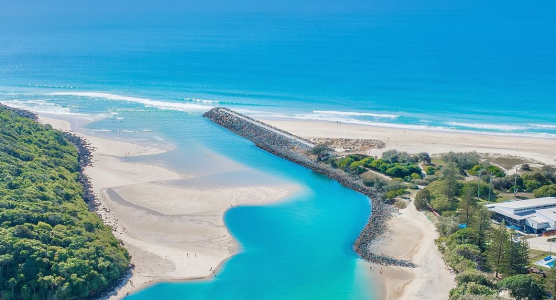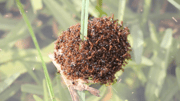Your next swim could be toxic: Human waste forces shocking closure of popular creek
By
Gian T
- Replies 0
As Australians, we cherish our beautiful beaches and pristine waterways, often as the backdrop for family gatherings, leisurely swims, and weekend adventures.
However, the recent closure of this creek reminds us that our natural aquatic playgrounds are vulnerable to contamination and environmental issues.
The Tallebudgera Creek, usually bustling with locals and tourists alike, was abruptly closed due to poor water quality after tests detected human faeces.
The discovery was made all the more distressing as volunteers patrol the beach on weekends.
They reported the water appeared murky brown last Sunday, far from the clear blue we associate with the Gold Coast.
One of the volunteers, Yvonne Curtis, recounted the unpleasant task of collecting human waste from the water, describing the situation as 'pretty horrible.'
The contamination was so severe that visibility in the water was reduced to less than 100mm.
Despite the challenges, volunteers worked tirelessly to keep people out of the water, prioritising public health and safety.
Surfrider Gold Coast, an organisation dedicated to monitoring water quality, had given the creek a medium water quality rating, or a yellow rating on its traffic light system, just days before the closure.
The City of Gold Coast lifeguards oversee the beach on weekdays and have since confirmed that it has reopened.
However, the recent closure reminds us of the creek's vulnerability.
It followed a significant sewerage leak late last year, traced back to a burst pipe at the Eleanora wastewater treatment plant in Palm Beach.
The issue of water contamination is not confined to the Gold Coast.
Sydney has also experienced closures, with multiple beaches shut down due to black 'tar balls,' which occur when oil mixes with debris and water, often due to oil spills or seepage.
Another beloved spot on the Gold Coast, the Currumbin Rock Pools, was closed almost two years ago after discovering intestinal bacteria.
This highlights the ongoing battle against pollutants in our waterways.
While the City of Gold Coast reported no illnesses associated with the bacteria at the time, the potential health risks cannot be ignored.
Enterococci bacteria, for example, can cause infections in the urinary tract or stomach and, in rare cases, endocarditis, an infection of the heart valves.
In other news, Coogee Beach in Sydney's eastern suburbs was closed after mysterious black, ball-shaped debris, believed to be 'tar balls,' was discovered.
Randwick Council has advised beachgoers to stay clear of the area and has initiated a clean-up operation. You can read more about it here.

How can local authorities prevent water pollution at famous beaches and creeks? How can beachgoers help keep waterways clean? Feel free to share your thoughts and opinions in the comments below.
However, the recent closure of this creek reminds us that our natural aquatic playgrounds are vulnerable to contamination and environmental issues.
The Tallebudgera Creek, usually bustling with locals and tourists alike, was abruptly closed due to poor water quality after tests detected human faeces.
The discovery was made all the more distressing as volunteers patrol the beach on weekends.
They reported the water appeared murky brown last Sunday, far from the clear blue we associate with the Gold Coast.
One of the volunteers, Yvonne Curtis, recounted the unpleasant task of collecting human waste from the water, describing the situation as 'pretty horrible.'
The contamination was so severe that visibility in the water was reduced to less than 100mm.
Despite the challenges, volunteers worked tirelessly to keep people out of the water, prioritising public health and safety.
Surfrider Gold Coast, an organisation dedicated to monitoring water quality, had given the creek a medium water quality rating, or a yellow rating on its traffic light system, just days before the closure.
The City of Gold Coast lifeguards oversee the beach on weekdays and have since confirmed that it has reopened.
However, the recent closure reminds us of the creek's vulnerability.
It followed a significant sewerage leak late last year, traced back to a burst pipe at the Eleanora wastewater treatment plant in Palm Beach.
The issue of water contamination is not confined to the Gold Coast.
Sydney has also experienced closures, with multiple beaches shut down due to black 'tar balls,' which occur when oil mixes with debris and water, often due to oil spills or seepage.
Another beloved spot on the Gold Coast, the Currumbin Rock Pools, was closed almost two years ago after discovering intestinal bacteria.
This highlights the ongoing battle against pollutants in our waterways.
While the City of Gold Coast reported no illnesses associated with the bacteria at the time, the potential health risks cannot be ignored.
Enterococci bacteria, for example, can cause infections in the urinary tract or stomach and, in rare cases, endocarditis, an infection of the heart valves.
In other news, Coogee Beach in Sydney's eastern suburbs was closed after mysterious black, ball-shaped debris, believed to be 'tar balls,' was discovered.
Randwick Council has advised beachgoers to stay clear of the area and has initiated a clean-up operation. You can read more about it here.
Key Takeaways
- Tallebudgera Creek on the Gold Coast was closed due to poor water quality, with human faeces being detected in the water.
- Heavy rainfall has affected the water's clarity, causing the beach to appear murky and affecting its quality.
- A volunteer who patrols the beach on weekends collected the human faeces, and the beach was closed for health reasons.
- The City of Gold Coast confirmed that all beaches have since reopened, but this incident follows previous water quality issues in the area.









